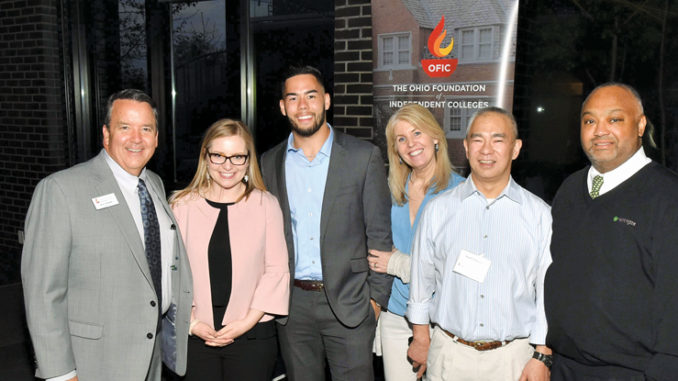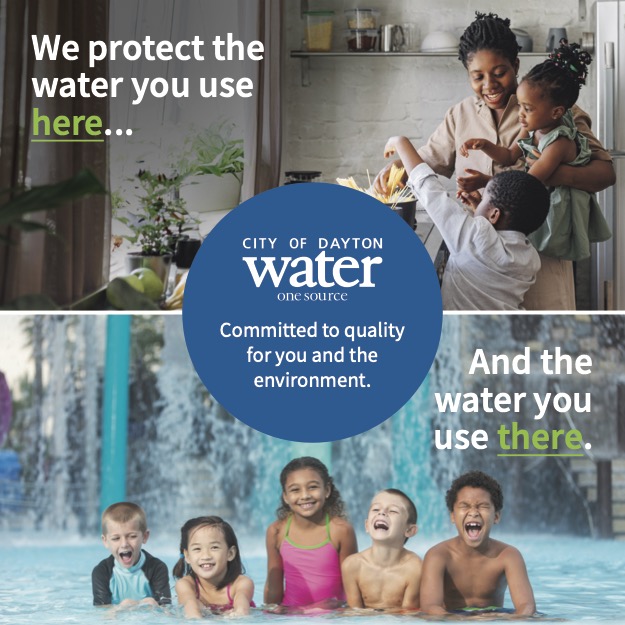
The Ohio Foundation of Independent Colleges helps businesses like Huntington Bank solve a shortage of qualified talent through scholarships
By Kevin Michell
While Ohio employers increasingly seek college graduates with bachelor’s degrees or better—amid the talent crunch caused by declining unemployment rates, no less—it has become harder for students to attend Ohio’s independent colleges and universities over the last decade between rising tuitions and reduced state funding.
This underscores the importance of the work done by The Ohio Foundation of Independent Colleges (OFIC), a 69-year-old organization that connects Ohio corporations to its 33 OFIC member campuses throughout the state and their 80,000 students.
Columbus’ Huntington Bank is one of the longest-tenured corporate partners of OFIC. What started in 1956 with monetary donations that were distributed to Ohio’s independent colleges has continued and evolved into creating scholarships with that money. Over the six-decade relationship, Huntington has funneled over $1.4 million to OFIC and created 565 scholarships.
“I would hope, right then and there, that sends the message: We believe in the mission and we believe in the support to those students,” says Diana Westhoff, vice president and senior business risk analyst at Huntington Bank and herself a graduate of an OFIC member school, Otterbein University.
OFIC started raising money from corporate donors for scholarships in 1986, which has now become the primary outlet for distributing funds back to its member schools. These scholarships can be customized for each company by choosing to focus the scholarships on specific fields of study or parts of the state near where they are headquartered, for example. The criteria can be shaped to fit what the company identifies as a need for its workforce.
No matter the form, each scholarship’s goal is twofold: Companies provide a path to a degree for young Ohioans, especially those from low-income families or who are the first in their family to attend college, while they also get to build a relationship with the scholarship recipients during their time at school, allowing for the opportunity to hire them after graduation and fill a need for talent in the company. This campus-to-career connection provides demonstrable return on investment for each company by reducing the pressure and overall cost of recruiting talent.
Huntington Bank takes an active role in each scholarship, identifying students who are interested in the financial sector and who could benefit the company as full-time employees, then providing meet-and-greet events and other opportunities for them to get a feel for Huntington as potential employer. If the timing is right, a position is open and the student wants to join the company, they can be hired on after graduation without skipping a beat.
That’s how Jordan Nishizaki, who was one of the 18 recipients of the Huntington-funded scholarships who graduated last year, was hired on as an auditor shortly after he finished his schooling at OFIC member campus Mount Vernon Nazarene University.
“Oh my gosh, he impressed everyone,” Westhoff warmly recalls of the impression Nishizaki made at last year’s Huntington meet-and-greet. “He’s been wonderful here and is already just hitting things out of the ballpark with his knowledge and skills.”
To OFIC President Bill Spiker, it’s examples like Huntington’s that are emblematic of how these corporate-funded scholarships benefit every person and entity involved, from the company to the student recipient to the independent school that they attend. Beyond that, it even benefits the state economy by keeping talented workers in Ohio after graduation. As more companies participate in creating scholarships with OFIC, the statewide impact becomes more tangible and effective.
“These small incremental steps can add up to truly have an impact on the growth and vitality of the state of Ohio,” says Spiker.
Since Huntington started customizing its scholarships to fit its down-the-road hiring needs, it has solidified a campus-to-career connection that creates a positive holistic impact through providing a path to students, helping OFIC schools maintain enrollment and giving the bank a stable talent pipeline.
“It is a great example of a full circle relationship that provides dollars for a student that is identified, that is introduced to Huntington and that becomes an employee,” Spiker says.
These scholarships can be scaled to businesses of any size—small or midsize businesses can achieve the same campus-to-career connection as Huntington through their own targeted scholarships. Spiker points out this program can work for any company seeking candidates with at least a bachelor’s degree. Between the diverse skills developed and the unique programs offered at the 33 OFIC schools—such as Wilmington College’s agricultural program, for one—businesses can continually bring in well-rounded and prepared workers to plug into any aspect of their company.
That’s not just because corporations are getting college graduates through OFIC scholarships; they’re getting workers who have benefited from what Ohio’s independent colleges can offer that larger schools often cannot. Spiker attributes this to the smaller campuses allowing a greater focus on each student’s success. OFIC member schools can support students’ needs more directly, which is one of the reasons why they demonstrate better graduation rates, particularly regarding first generation students, low-income students and students of color. It’s a better environment for students to find a career they’re passionate about, which enhances the efficacy of OFIC scholarships.
Westhoff, as an alumna of Otterbein, agrees.
“I can speak to the independent college attention you get, the quality of professors, and just the level of study and academic events,” she says, pointing out that the experience can better prepare students for corporate life. “You just bring a different quality to the workforce.”
“With OFIC partnering with these independent colleges to get that pipeline of qualified workers,” Westhoff adds, “there is intentionality in really working with those students and getting them ready for the workforce.”
Spiker says that companies and foundations interested in exploring the potential of their own OFIC scholarships can get involved with minimal effort. Particularly with smaller and midsize businesses, there can be some worry that the company’s talent needs may make them feel they can’t partner with OFIC to create a talent pipeline sized to their needs.
“It’s as easy as a quick phone call or email and we’ll come to you,” says Spiker. In addition, OFIC will be holding informational events at its 33 member campuses that will be open for companies and students and their families to attend to learn more about OFIC’s work as well as its annual Evening of Excellence dinner on April 22, 2020, in Columbus.



